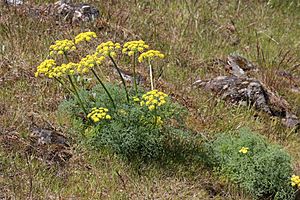Gray's biscuitroot facts for kids
Quick facts for kids Lomatium grayi |
|
|---|---|
 |
|
| Scientific classification | |
| Kingdom: | |
| (unranked): | |
| (unranked): | |
| (unranked): | |
| Order: | |
| Family: | |
| Tribe: |
Selineae
|
| Genus: | |
| Species: |
L. grayi
|
| Binomial name | |
| Lomatium grayi (Coult. & Rose) Coult. & Rose
|
|
Lomatium grayi, commonly known as Gray's biscuitroot, Gray's desert parsley, or pungent desert parsley, is a perennial herb of the family Apiaceae. It is native to Western Canada in British Columbia, and the Western United States, including from the Eastern Cascades and northeastern California to the Rocky Mountains.
It is a perennial herb found growing in dry rocky banks and slopes. It has a lifespan of 5–7 years.
Contents
Description
Lomatium grayi has glabrous stems that split at the ground, and a long, thick taproot. It flowers from March to July with 1–20 compound umbels, each with hundreds of yellow flowers.
- Varieties
- Lomatium grayi var. depauperatum — Gray's biscuitroot (M.E. Jones) Mathias; endemic to northeastern Nevada and northwestern Utah.
- Lomatium grayi var. grayi — Gray's biscuitroot.
Taxonomy
A 2018 study has proposed splitting L. grayi into four species, based on morphometric analysis: Lomatium klickitatense in Klickitat County, Washington and surrounding areas; Lomatium papilioniferum in the rest of the Pacific Northwest; Lomatium depauperatum (formerly L. grayi var. depauperatum) in western Utah and eastern Nevada; and Lomatium grayi s.s. in the western Rocky Mountains and adjoining basins.
Uses
The plant was used as a food source by the Northern Paiute people in Oregon; new tender stems were eaten raw, and the roots were a winter 'starvation food.'
Images for kids


